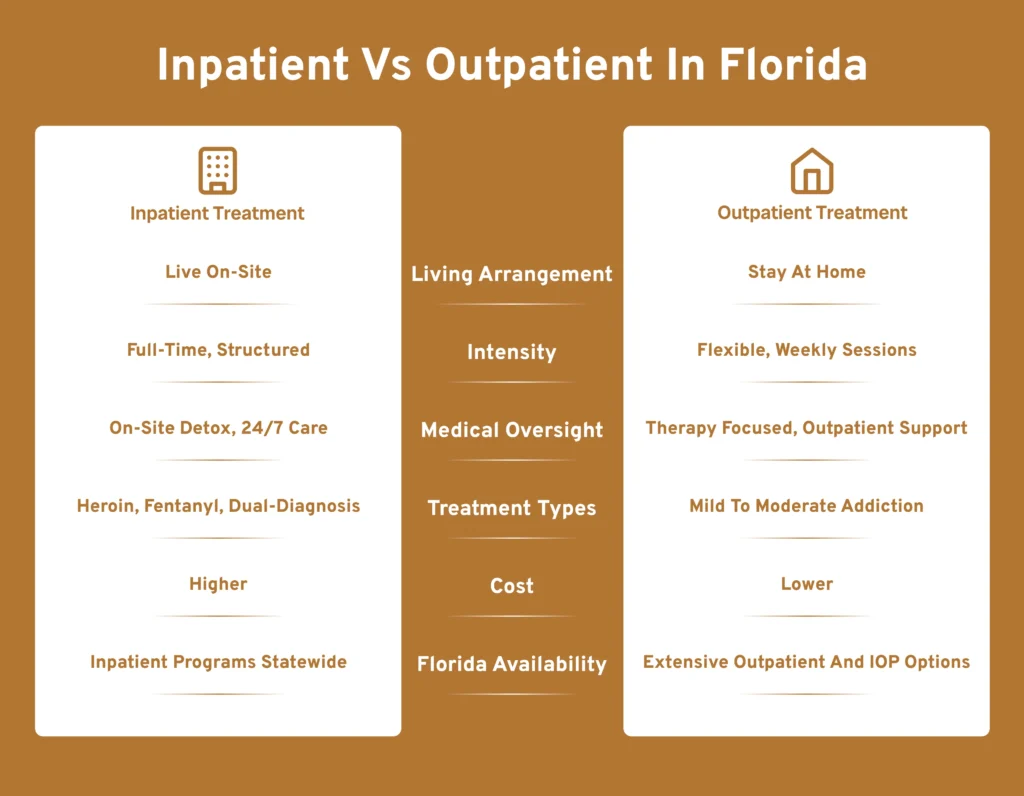When you’re seeking help for addiction or mental health recovery, one of the first questions you’ll face is: Should I choose inpatient or outpatient rehab? Both offer life-changing support, but they work best for different people. This guide will walk you through the key differences, expert-backed benefits, and how to know which option fits your journey.
Whether you’re struggling with fentanyl dependency, alcohol misuse, or co-occurring disorders like anxiety or PTSD, the structure of your treatment matters. Inpatient rehab provides full-time, immersive care, while outpatient rehab offers the flexibility to recover while staying active in daily life. But it’s not just about time — it’s about what level of support your recovery really needs.
Florida offers a wide range of rehab options, and at DrugsRehabFL our role is to help you cut through the noise. We don’t just place you into a program — we evaluate your mental health, substance use history, and lifestyle to recommend a path that will actually work. This guide will give you clarity, confidence, and honest answers so you can take that next step — with purpose.
Understanding the Basics: What Is Inpatient vs Outpatient Rehab?
Inpatient rehab is full-time, residential care where you live at a facility for 30 to 90 days or more. You receive 24/7 medical and emotional support, structured routines, and intensive therapy. It’s designed for those dealing with severe addiction, dual diagnoses, or previous relapses.
Outpatient rehab, on the other hand, allows you to stay at home while attending scheduled therapy sessions. It’s ideal for those with milder addiction symptoms, strong support systems, or work/family commitments.
One of the biggest differences between these two lies in the level of structure and daily accountability. In inpatient rehab, your time is tightly scheduled, from therapy sessions to meals and recreation designed to eliminate external distractions and triggers. Outpatient treatment gives you more freedom, but that freedom requires you to be more proactive about staying on track and managing your environment.
💡 Florida Insight: At Drugs rehab inpatient drug treatment is available for serious cases like fentanyl or heroin addiction, while outpatient programs serve those with mild-to-moderate addiction across Florida. Whether you’re dealing with drug use or dual diagnosis, we support you every step.
Emotional Readiness Matters
One angle often overlooked is mental and emotional readiness. According to New Horizons center, a person’s willingness to engage plays a big role in their success—no matter the setting. Inpatient care can feel like a safe bubble, while outpatient demands more self-discipline.
Choosing a rehab path based on your emotional capacity is more effective than simply defaulting to what feels more convenient. If you’ve experienced emotional instability, frequent relapses, or unmanaged mental health symptoms, starting with inpatient treatment may give you the grounding you need before stepping back into daily life.
All treatment plans, from bipolar or depression with substance disorder to substance-only addiction are assessed holistically, ensuring you get care that fits where you truly are, not just where medical necessity says you should be.
Still unsure which option is right for you?
Our Florida-based team at Drugs Rehab FL offers free assessments to help match your needs with the right program, whether inpatient or outpatient.
Recovery Happens in Stages: Step‑Down Options
Recovery is a journey, not an overnight switch. Many patients transition from inpatient care into continuing support through structured outpatient and intensive outpatient programs (IOP). This helps maintain momentum while reintegrating into daily life.
This staged approach gives people time to build their coping skills gradually. It’s especially helpful when leaving the highly structured setting of inpatient rehab. Stepping down to outpatient care lets you practice what you’ve learned in real life while still having consistent professional support. It’s not a step backward—it’s an intentional transition.
If you complete inpatient detox or rehab (common with fentanyl or cocaine addiction treatment), our outpatient services in Florida continue the care with individual therapy, relapse planning, and dual diagnosis support, so you’re never alone post-rehab.
🗣️ Case Story: Recovery, Florida Style
Take Layla, a 34-year-old mother of two from Tampa. After completing 45 days of inpatient detox and therapy at our Florida facility, she transitioned into our outpatient program. With ongoing therapy and medication-assisted treatment (MAT), she rebuilt her career and mended relationships—all while staying sober. That blend of immersive care and community reintegration made the difference.
Financial & Insurance Considerations
Inpatient rehab often costs more due to accommodations and around-the-clock care, but many insurance plans now cover both types of treatment. American Addiction center notes that telehealth, partial hospitalization, and intensive outpatient programs (IOPs) are also viable middle grounds.
Planning financially can be overwhelming, but knowing your options upfront helps. Some rehab centers offer flexible payment structures, accept a variety of private insurance plans, or connect you with third-party financing options. While cost is a factor, the long-term value of recovery far outweighs short-term expenses.
Understanding the cost structure of rehab goes beyond knowing the price tag, it’s about grasping what you’re actually paying for. In inpatient settings, costs typically bundle together housing, meals, 24/7 medical supervision, therapy sessions, medication, and post-treatment planning. Outpatient programs, while less expensive, often charge per session or per service, and these can add up over time. Additionally, some plans require pre-authorization or only cover care deemed “medically necessary,” so reading the fine print is crucial. Beyond insurance, many people finance treatment through HSA/FSA accounts, medical credit lines, or employer wellness benefits. Knowing these tools exist can help you access care faster and more confidently, without putting off treatment due to uncertainty.
Medical Supervision & Dual Diagnosis Care
Addictions like cocaine, fentanyl, or benzodiazepines—and conditions like depression or anxiety—often require clinical expertise. Inpatient settings provide on-site monitoring and medical detox, while outpatient care includes therapy and medication if safely managed at home.
Our Florida facilities are equipped for dual diagnosis treatment, offering integrated care that addresses both mental health disorders and substance use. This means patients receive care that treats the whole person—from detox to ongoing therapy—tailored to their medical and emotional needs.
Without addressing both addiction and mental health together, recovery may be incomplete.
For example, someone treated for opioid use but not for underlying anxiety is more likely to relapse. Dual diagnosis programs integrate therapies like CBT and medication management to support both conditions at once, increasing the chance of lasting sobriety.
Recovery Checklist
Before you choose, ask yourself:
✅ Can I stay clean and focused in my current environment?
✅ Do I have reliable support at home?
✅Have I tried treatment before?
✅ Do I need detox services first?

Comparison at a Glance: Inpatient vs Outpatient Rehab in Florida
| Feature | Inpatient Rehab | Outpatient Rehab |
| Living Arrangement | Live on-site | Stay at home |
| Intensity | Full-time, structured | Flexible, weekly sessions |
| Medical Oversight | On-site detox, 24/7 care | Therapy focused, Outpatient support |
| Treatment Types | Heroin, fentanyl, dual-diagnosis | Mild to moderate addiction |
| Cost | Higher | Lower |
| Florida Availbility | Inpatient programs statewide | Extensive Outpatient and IOP options |
Your recovery shouldn’t wait
Call now for various treatments, Recovery starts with one call
What is inpatient drug rehab?
Residential treatment with daily therapy, medical detox, and behavioral support.
What is outpatient rehab like?
Non-residential care including scheduled therapy and counseling sessions—ideal for stable individuals with strong home support.
Which program is more effective?
Both work. Inpatient is better for severe cases or mental health concerns, outpatient suits motivated individuals maintaining daily commitments.
Can I switch between inpatient and outpatient programs?
Yes. Transitioning—from inpatient to outpatient—is common and often encouraged for long-term success.
How successful is inpatient rehab?
Inpatient rehab has shown strong success rates, particularly for individuals with severe addiction, co-occurring mental health conditions, or a history of relapse. According to the National Institute on Drug Abuse (NIDA), comprehensive treatment followed by continued care can reduce drug use by 40–60%. Success rates are highest when inpatient rehab is followed by ongoing outpatient support and aftercare planning. However, recovery is not “one-size-fits-all,” and long-term success often depends on a person’s readiness, social support, and engagement in therapy after discharge.
How successful is outpatient rehab?
Outpatient rehab can be highly effective, especially for individuals with strong motivation, stable living environments, and less severe substance use. This Research shows that structured outpatient programs, particularly intensive outpatient programs (IOPs), have outcomes comparable to inpatient rehab when the individual is a good candidate. The key factors for outpatient success include consistent attendance, a reliable support system, and participation in aftercare. Outpatient rehab is also more flexible, making it easier for some people to sustain recovery while managing responsibilities like work or school.


